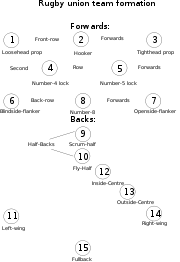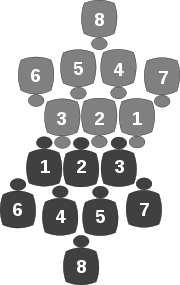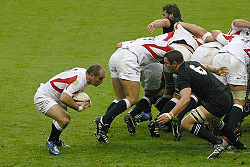
Flanker (rugby union)
Encyclopedia

Rugby union
Rugby union, often simply referred to as rugby, is a full contact team sport which originated in England in the early 19th century. One of the two codes of rugby football, it is based on running with the ball in hand...
. Flankers play in the forwards, and are generally classified as either blindside, or openside flankers; numbers six and seven respectively. The name comes from their position in a scrum
Scrum (rugby union)
In rugby union a scrum is a means of restarting play after a minor infringement. It involves up to eight players from each team, known as the pack or forward pack, binding together in three rows and interlocking with the free opposing teams forwards. At this point the ball is fed into the gap...
in which they flank each set of forwards. The set responsibilities of flankers are fewer than all other forwards in a rugby team, but generally consists of retaining and gaining possession in the various phases of play in a match—most commonly in rucks and mauls. Flankers also assist in pushing in a scrum, but are expected to detach from the scrum as early as possible in order to get to play before the opposition's forwards. Flankers also participate in line-out
Line-out
A line-out is the means by which, in rugby union, the ball is put back into play after it has gone into touch. It is the equivalent of the throw-in in soccer. Rugby league abolished line-outs in 1897...
s, either being lifted to contest or win possession, or to lift other players. Rugby flankers are expected to make most of the tackles. When a team wins the scrum the flanker is expected to support their players by running behind and rucking over for their team to keep possession.
Like other forward positions, flankers put more emphasis on strength than on speed.
Naming

New Zealand
New Zealand is an island country in the south-western Pacific Ocean comprising two main landmasses and numerous smaller islands. The country is situated some east of Australia across the Tasman Sea, and roughly south of the Pacific island nations of New Caledonia, Fiji, and Tonga...
when they used a now archaic scrum formation. This term is rarely used anymore, but the terms breakaway, flank, and flank forward are sometimes used. Collectively the flankers, as well as the number eight can also be known as the back-row—referring to their scrum positions—or as loose-forwards because they are loosely bound to the scrum.
Role
Flankers are the players with the fewest set responsibilities and therefore the position where the player should have all round attributes: speed, strength, fitness, tackling and handling skills. Flankers are always involved in the game, as they are the real ball winners in broken play, especially the No. 6. Blindside flankers tend to be bigger (so they can stop the opposite number 8 off the back of scrums) but not as fast as their partners on the openside who tend to be the smaller.In open play, flankers will often stand behind the back line 'supporting' them in open play. If any ball is dropped by the backs, the flankers' job is to clear up messy ball and start a new phase of play. Because they are always close to the ball, they are often first to the break down.
Flankers do less pushing in the scrum
Scrum (rugby union)
In rugby union a scrum is a means of restarting play after a minor infringement. It involves up to eight players from each team, known as the pack or forward pack, binding together in three rows and interlocking with the free opposing teams forwards. At this point the ball is fed into the gap...
than the tight five, but need to be fast as their task is to break quickly and cover the opposing half-backs if the opponents win the scrum. At one time, flankers were allowed to break away from the scrum with the ball but this is no longer allowed and they must remain 'bound' to the scrum until the ball is out. Flankers also have to defend at the back of the scrum if the opposition wins the ball and the opposing number 8 decides to pick and go, a term used to describe the action where the number 8 picks up the ball from the back of the scrum and drives forward with it.
Flankers usually protect scrum-halves during scrums from the opposing scrum-half following around and tackling him/her. The two flankers do not usually bind to the scrum in a fixed position. Instead, the openside (occasionally known as the strong side) flanker will attach to the scrum on whichever side is further from the nearer touchline, while the blind-side (occasionally known as weak side or closed side) flanker attaches himself to the scrum on the side closer to the touchline.
Since most of the back play is usually on the open side, where there is more space, it is usually the openside flanker's job to be the first to any breakdown of play and to get his/her hands on any loose ball (or to cause a breakdown by tackling the ball carrier or otherwise hurrying him into error). At a scrum where the ball has been won by the opposition, the openside flanker often has the best view of when the ball is out and is able to break away and close down the opposing ball-carrier, reducing the time available for a pass or kick. Openside flankers are often smaller than their blindside counterparts.

Line-out
A line-out is the means by which, in rugby union, the ball is put back into play after it has gone into touch. It is the equivalent of the throw-in in soccer. Rugby league abolished line-outs in 1897...
, where they may well be used as a jumper they can also be used for breaking their opposition line in open play using their speed and strength to break tackles. They are generally larger than openside flankers.
Most countries prefer a quicker openside flanker with the ability to get off the scrum quickly so that he can scavenge for the ball. In South Africa, however, they prefer their blindside flanker quicker. The reason for this is that it is the blindside flanker's duty to carry the ball, meaning they prefer the person running with the ball being quicker rather than the person trying steal it. They want an openside flanker to rather know and have anticipation skills of where the next ruck or maul is going to be, therefore they don't disrupt defensive lines by rushing up to a ruck.
Flankers are not always assigned specific roles as opensides and blindsides. For example, flankers Finlay Calder
Finlay Calder
Finlay Calder is a Scottish former rugby union player.Born in Haddington, East Lothian and educated at Stewart's Melville College, Calder played at open side flanker and won 34 caps representing Scotland from 1986-91. He captained the British Lions tour to Australia in 1989...
and John Jeffrey
John Jeffrey
John Jeffrey is a Scottish former internationalistrugby union player. His nicknames are "The Great White Shark" and "JJ", the former because of his blond "thatch of hair"....
(Scotland
Scotland national rugby union team
The Scotland national rugby union team represent Scotland in international rugby union. Rugby union in Scotland is administered by the Scottish Rugby Union. The Scotland rugby union team is currently ranked eighth in the IRB World Rankings as of 19 September 2011...
) played left and right, rather than open and blind. French teams tend not to make a distinction between the two roles, and their flankers also usually play left and right rather than open and blind: thus, Serge Betsen
Serge Betsen
Serge Betsen Tchoua is a French rugby union player who plays as a flanker for London Wasps at club level and formerly for internationally...
(France
France national rugby union team
The France national rugby union team represents France in rugby union. They compete annually against England, Ireland, Italy, Scotland and Wales in the Six Nations Championship. They have won the championship outright sixteen times, shared it a further eight times, and have completed nine grand slams...
) wears the number six (which in most teams denotes a blindside flanker) but may pack down on either the open or blind sides of the scrum, and will often harass the opposition fly-half in the manner of an openside; like Calder and Jeffrey for Scotland, he and Olivier Magne
Olivier Magne
Olivier Claude C. Magne is a French former rugby union footballer and a current coach.Magne was a rugby god and back row forward, known especially for his speed and handling in open field play. He represented 89 times, scoring 14 tries.He joined his hometown team, Stade Aurillacois, as a boy in...
formed an outstanding left-right partnership for France. South African teams generally use openside and blindside flankers, but play the more agile 'fetcher' in the number six shirt, while the larger and quicker (blindside) flanker wears seven. George Smith
George Smith (rugby player)
George Smith is an Australian rugby union player. He is a flanker for Toulon. He won 110 caps for Australia before retiring from international rugby on 5 February 2010. He made his Test debut in 2000 against France in Paris and he is the most capped Wallaby forward, and the most capped flanker in...
is a notable flanker who sometimes played on the blindside, but nowadays plays on the openside.
Notable flankers
Michael JonesMichael Niko Jones
Michael Niko Jones is a New Zealand former rugby union player and coach. He was nicknamed 'the Iceman' or 'Ice' because of the number of icepacks he needed for injuries. He has been voted by Rugby World magazine as the third best All Black of the 20th century after Colin Meads and Sean Fitzpatrick...
(New Zealand
All Blacks
The New Zealand men's national rugby union team, known as the All Blacks, represent New Zealand in what is regarded as its national sport....
), Ian Kirkpatrick
Ian Kirkpatrick
Ian Andrew Kirkpatrick is a former New Zealand rugby union player, who was captain of the All Blacks.Kirkpatrick began his first-class career in 1966 at the age of 20 playing for Poverty Bay. One year later in he moved to Canterbury and established himself in the local provincial team...
(New Zealand
All Blacks
The New Zealand men's national rugby union team, known as the All Blacks, represent New Zealand in what is regarded as its national sport....
), Graham Mourie
Graham Mourie
Graham Neil Kenneth Mourie is a former New Zealand All Black flanker and coach of the Hurricanes. He was one of the great All Black Captains in the late 70s and early 80s...
(New Zealand
All Blacks
The New Zealand men's national rugby union team, known as the All Blacks, represent New Zealand in what is regarded as its national sport....
), Richard Hill
Richard Hill
Richard Hill may refer to:* Richard Hill , Bishop of London and Archdeacon of Lewes* Richard Hill , Catholic priest and martyr* Richard Hill , British contemporary composer...
(England
England national rugby union team
The England national rugby union team represents England in rugby union. They compete in the annual Six Nations Championship with France, Ireland, Scotland, Italy, and Wales. They have won this championship on 26 occasions, 12 times winning the Grand Slam, making them the most successful team in...
), Francois Pienaar
Francois Pienaar
Jacobus Francois Pienaar is a South African former rugby union player. He played flanker for South Africa from 1993 until 1996, winning 29 international caps, all of them as captain. He is best known for leading South Africa to victory in the 1995 Rugby World Cup...
(South Africa
South Africa national rugby union team
The South African national rugby union team are 2009 British and Irish Lions Series winners. They are currently ranked as the fourth best team in the IRB World Rankings and were named 2008 World Team of the Year at the prestigious Laureus World Sports Awards.Although South Africa was instrumental...
), Jean Prat
Jean Prat
Jean Prat was French rugby union footballer. He was awarded the Légion d'honneur in 1959. He played over 50 times for France and is a member of both the International Rugby Hall of Fame and IRB Hall of Fame, being inducted in 2001 and 2011 respectively...
(France
France national rugby union team
The France national rugby union team represents France in rugby union. They compete annually against England, Ireland, Italy, Scotland and Wales in the Six Nations Championship. They have won the championship outright sixteen times, shared it a further eight times, and have completed nine grand slams...
), Jean-Pierre Rives
Jean-Pierre Rives
Jean-Pierre Rives is a French former rugby union player who won 59 caps for France as a flanker. Although considered too small by some for the position, Rives displayed tremendous courage and flair, epitomising the spirit of French rugby...
(France
France national rugby union team
The France national rugby union team represents France in rugby union. They compete annually against England, Ireland, Italy, Scotland and Wales in the Six Nations Championship. They have won the championship outright sixteen times, shared it a further eight times, and have completed nine grand slams...
), Fergus Slattery
Fergus Slattery
John Fergus Slattery is a former rugby union player who represented Ireland. He played schools rugby for Blackrock College and then moved on to play senior rugby for UCD, before earning a call up to the Ireland team in 1970. During his career Slattery earned 61 caps, 18 as captain, and scored 3...
(Ireland
Ireland national rugby union team
The Ireland national rugby union team represents the island of Ireland in rugby union. The team competes annually in the Six Nations Championship and every four years in the Rugby World Cup, where they reached the quarter-final stage in all but two competitions The Ireland national rugby union...
and Lions
British and Irish Lions
The British and Irish Lions is a rugby union team made up of players from England, Scotland, Ireland and Wales...
), Sean O'Brien
Sean O'Brien
Sean O'Brien may refer to:*Seán O'Brien , Gaelic footballer with Nemo Rangers*Sean O'Brien , Irish rugby union player*Sean O'Brien , based in Australia, competes on the Windsurfing World Tour...
(Ireland
Ireland national rugby union team
The Ireland national rugby union team represents the island of Ireland in rugby union. The team competes annually in the Six Nations Championship and every four years in the Rugby World Cup, where they reached the quarter-final stage in all but two competitions The Ireland national rugby union...
), Richie McCaw
Richie McCaw
Richard Hugh "Richie" McCaw is a New Zealand rugby union player, and is the current test captain. He plays in the openside flanker position for the New Zealand, Crusaders and Canterbury rugby teams...
(New Zealand
All Blacks
The New Zealand men's national rugby union team, known as the All Blacks, represent New Zealand in what is regarded as its national sport....
), Wavell Wakefield, Schalk Burger
Schalk Burger
Schalk Burger Jr. is a South African rugby union player. He plays the position of flanker in the Springbok rugby union team.-Father:...
(South Africa
South Africa national rugby union team
The South African national rugby union team are 2009 British and Irish Lions Series winners. They are currently ranked as the fourth best team in the IRB World Rankings and were named 2008 World Team of the Year at the prestigious Laureus World Sports Awards.Although South Africa was instrumental...
), Thierry Dusautoir
Thierry Dusautoir
Thierry Dusautoir is a French rugby union player who currently plays for France at international level and Toulouse in the French Top 14 club competition. Dusautoir is a strong ball carrier with good speed and strength to get out of tackles.Dusautoir was born in Abidjan, Côte d'Ivoire...
(France
France national rugby union team
The France national rugby union team represents France in rugby union. They compete annually against England, Ireland, Italy, Scotland and Wales in the Six Nations Championship. They have won the championship outright sixteen times, shared it a further eight times, and have completed nine grand slams...
)

